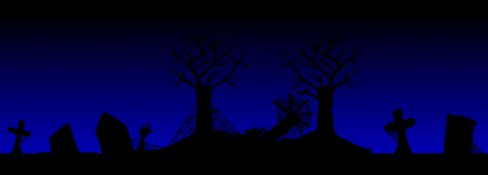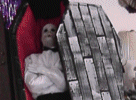The History of Halloween
|
|
For those convinced that the history of Halloween and its associated traditions have evil, sinister origins, we beg to differ.
We've uncovered the true story of the origins and traditions of Halloween.
The True History of HalloweenAh, Halloween! The nip in the air, the fragrance of wood-smoke on the breeze, the hordes of little ghosties and ghoulies stomping around the neighborhood -- it all comes together to lift my spirits and make me optimistic about the seasons to come. You see, that's been the intent of Halloween all along, despite its modern characteristics. The history of Halloween began, in ages past, as a simple harvest holiday: a celebration of a bountiful year, and a hope that the year yet born would be at least as productive as the one past. Though few people realize it as they're slapping creepy holiday address labels onto their scary party invitations and carving jack-o'-lanterns to look like bats or witches, the Halloween we celebrate today is a curious combination of the old and the new. Its roots are ancient, beginning with traditions celebrated by the pre-Christian Celts who once inhabited the British Isles. The ancient Celts divided the year into two parts: Beltane, the growing season, and Samhain, which literally means "summer's end." Samhain (pronounced "Sow-en") was a time for celebration, a final feast in defiance of winter's hardships. Back then, it mostly involved eating a lot, cleaning the household, extinguishing the hearth fires and restarting them in a gesture of renewal, commemorating those who had passed away during the year, and dancing around a communal bonfire. Many Wiccan groups still practice these types of celebration rituals today during Samhain festivals. And let's just dispel the grossly misunderstood notion that Wiccan's are evil. Quite the contrary! While many Wiccans do refer to themselves as "witches", they do NOT worship the Devil or any other evil deity for that matter. The vast majority of Wiccan practices can be characterized by or expressing goodwill or kindly feelings which they derive from nature oriented practices derived from pre-Christian religions. The Wiccan Rede (pronounced "reed") is a saying that was formulated to sum of the ethics of the Neo-Pagan religion Wicca. There are many variations of the Rede and one of the most common is, "An' it harm none, do what ye will". As you can see the Wiccan Rede is very similar to the Golden Rule, a belief found in nearly every religion – "Do unto others as you would have them do unto you." The history of Halloween we know today is actually a Christian creation. It all started in the 800s, when the Catholic Church merged two existing Roman festivals called Feralia and Pomona's Day with Samhain, in a successful attempt to replace all three. Pomona's Day was originally a harvest festival in honor of the Roman goddess of fruits and trees; this may explain the tradition of bobbing for apples. Feralia was a day for mourning and remembering the dead. Christians began celebrating All Saints Day on November 1, with observances beginning at sunset the night before. Among other things, people dressed in costumes as Christian saints to scare away evil spirits, and then went door-to-door, begging for food. Sound familiar? Later on All Soul's Day (a holiday commemorating the dead who were not saints) was added to the mix on November 2. Celebrants took to going from house to house asking for little soul cakes (currant buns) in exchange for praying for the souls of a household's dead. By 1500 AD, All Saints and All Soul's Days had evolved into Hallow Time (October 31-November 2), with most of the celebrations occurring the night before All Hallows Day -- All Hallows Eve. It wasn't long before "All Hallows Eve" evolved into "Hallowe'en." Now fast forward to today and the celebrations many of us participate in. Adults have Halloween parties and purchase bloody decorations and other creepy "toys" to try and scare their guests with. Grown up parties usually involve eating and drinking – and of course dancing with or without the traditional bon fire. Traditional kiddie Halloween parties include comic-scary decorations, spook houses and candy galore. You can get the cutest Halloween party invitations with matching return address labels. Trick-or-treating, dressing in costumes, honoring the dead and celebrating the good that's come to you during the year; all these are living, breathing traditions that tie us to ancestors who lived hundreds and thousands of years ago. Underneath all our fun traditions, the history of Halloween remains what it always was: a celebration of a year drawing to a close, and a joyous laugh in the face of the winter to come. |

